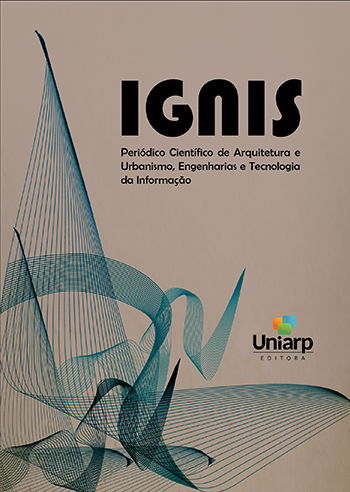ARPS E SUAS APLICAÇÕES NA ENGENHARIA CIVIL
Palabras clave:
ARP/RAPS, Formação do Conhecimento, Engenharia Civil.Resumen
Este artigo trata de uma reflexão a respeito das Aeronaves Remotamente Pilotadas (ARPs) direcionando suas aplicações no âmbito da Engenharia Civil. Sendo um tema relevante por ser uma tecnologia recente e ainda pouco explorada, fundamenta a necessidade deste material. Apresenta definições pertinentes frente o regulamento da Agência Nacional da Aviação Civil (ANAC). Pontua sua aplicação na intervenção de alguns exemplos práticos de intervenção engenharia, e as legislações pertinentes, bem como explicita a importância do conhecimento destas tecnologias contemporâneas na formação do conhecimento do Engenheiro Civil.
Palavras-Chave: ARP/RAPS; Formação do Conhecimento; Engenharia Civil.
ABSTRACTThis article deals with a reflection on the respect of Remotely Piloted Aircraft (ARPs), directing their applications in the scope of Civil Engineering. Being a relevant topic because it is a recent technology and still little explored, it supports the need for this material. It presents relevant definitions to the front or regulation of the National Civil Aviation Agency (ANAC). It punctuates its application in the intervention of some practical examples of engineering intervention and in the relevant legislation, as well as explaining the importance of the knowledge of these contemporary technologies in the formation of the knowledge of the Civil Engineer.
Keywords: ARP / RAPS; Knowledge Formation; Civil Engineering.
Descargas
Publicado
Número
Sección
Licencia
Derechos de autor 2020 Paulo Barral de Hollanda Gomes Vieira, Liane da Silva Bueno

Esta obra está bajo una licencia internacional Creative Commons Atribución-NoComercial-SinDerivadas 4.0.
Autores que publicam nesta revista concordam com os seguintes termos:- Autores mantém os direitos autorais e concedem à revista o direito de primeira publicação, com o trabalho simultaneamente licenciado sob a Licença Creative Commons Attribution que permite o compartilhamento do trabalho com reconhecimento da autoria e publicação inicial nesta revista.
- Autores têm autorização para assumir contratos adicionais separadamente, para distribuição não-exclusiva da versão do trabalho publicada nesta revista (ex.: publicar em repositório institucional ou como capítulo de livro), com reconhecimento de autoria e publicação inicial nesta revista.
- Autores têm permissão e são estimulados a publicar e distribuir seu trabalho online (ex.: em repositórios institucionais ou na sua página pessoal) a qualquer ponto antes ou durante o processo editorial, já que isso pode gerar alterações produtivas, bem como aumentar o impacto e a citação do trabalho publicado (Veja O Efeito do Acesso Livre).






